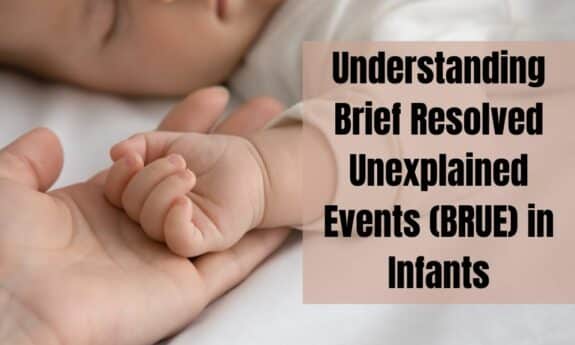A brief resolved unexplained event (BRUE) can be a terrifying experience for parents and caregivers of infants under one-year-old. It involves sudden changes such as cessation of breathing, altered muscle tone, turning pale or blue, or unresponsiveness, lasting less than 30 to 60 seconds.
Here’s what you need to know about BRUE
What is BRUE?
BRUE occurs unexpectedly, leaving caregivers anxious and uncertain. It’s termed as BRUE when no clear explanation can be found even after thorough examination and history-taking. Previously known as apparent life-threatening events (ALTEs), BRUE differs from Sudden Infant Death Syndrome (SIDS) and other outdated terms like “near-miss SIDS” or “aborted crib deaths.”
Causes
While the frequency of BRUE occurrences remains uncertain, certain underlying medical issues may trigger similar events, which are not classified as BRUE. These may include reflux after feeding, severe infections, birth defects, allergic reactions, or neurological disorders, among others. However, approximately half of the time, a specific cause for BRUE is not identified, especially in otherwise healthy infants.
Risk Factors
Several factors increase the likelihood of BRUE, including a history of prior similar events, feeding difficulties, recent respiratory infections, and age younger than 10 weeks. Additionally, low birth weight, premature birth, and exposure to secondhand smoke may heighten the risk.
Symptoms
BRUE typically manifests in breathing irregularities, color changes (often bluish or pale), altered muscle tone, and changes in responsiveness. Notably, choking or gagging suggests a different cause, such as reflux.
Diagnosis
Healthcare providers evaluate BRUE incidents by considering the nature and severity of symptoms, preceding events, and any underlying health issues. Physical examinations, along with a comprehensive medical history, help rule out potential causes. While routine lab tests may not be necessary, certain risk factors may prompt further investigations such as blood tests, imaging scans, or cardiac evaluations.
Treatment and Management
In most cases where the event was brief and resolved without complications, hospitalization may not be required. However, hospital admission may be necessary for closer monitoring if there are concerns about the severity of the event or suspected abuse or neglect. Caregivers are advised to follow safe sleep practices, avoid exposure to secondhand smoke, and learn proper response techniques in case of future events.
Outlook
Fortunately, most BRUE incidents are harmless, with no long-term health implications. BRUE is not considered a precursor to Sudden Infant Death Syndrome (SIDS). However, infants with risk factors may have a higher likelihood of recurrence or underlying serious conditions.
When to Seek Medical Help
It’s crucial to contact a healthcare provider immediately if there are suspicions of child abuse or neglect. Signs may include unexplained injuries, poisoning, or events occurring only in the presence of a single caregiver without apparent medical cause.
BRUE VS Sudden Infant Death Syndrome (SIDS)
BRUE and Sudden Infant Death Syndrome (SIDS) have distinct characteristics, and there is no evidence suggesting BRUE as a risk factor for SIDS. A brief resolved unexplained event (BRUE) involves sudden changes in an infant, such as breathing cessation, altered muscle tone, or color changes, lasting less than a minute. Despite previous misconceptions associating BRUE with SIDS, research since the 1980s has debunked this connection. While maternal smoking is a shared risk factor, BRUE and SIDS are fundamentally different phenomena, as confirmed by ongoing research.
Understanding BRUE and its potential causes and risk factors can empower parents and caregivers to respond effectively to these frightening episodes. By following proper precautions and seeking timely medical advice, they can ensure the well-being of their infants.
More Health News:







